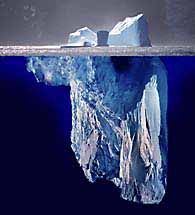R is for Research

(image Uwe Kils, Wiska Bodo via Wikimedia Commons)
R is for Research.

So, you probably know that Hemingway iceberg quote.
If not, here it is:
If a writer of prose knows enough of what he is writing about he may omit things that he knows and the reader, if the writer is writing truly enough, will have a feeling of those things as strongly as though the writer had stated them. The dignity of movement of an ice-berg is due to only one eighth of it being above water.
In other words, Hemingway says–no info dumps!
I hate info dumps. You’re reading along, after many struggles the couple is reunited and strolling hand-in-hand down the pristine beach when suddenly, out of nowhere, the author jumps in to tell you how many tons of yellow sand were trucked in from the Sahara forty years earlier. Do you care? No! You’ve just been subjected to the seven eighths the author researched that did not belong on the page.
I stopped reading Linda Fairstein mysteries even though I enjoy her plots and characters. Bad Blood was the last of her books I tried to read. The trails of a murder case led detectives into the subway tunnels when the author veered off and devoted PAGES AND PAGES to the history of the land, the equipment required to bore the tunnels, the accidents that plagued the “sand hogs.” Hemingway would have suffered an apoplexy.
But I do like learning stuff from novels. I learned a lot about the Japanese community of Seattle in the years before World War Two in The Hotel on the Corner of Bitter and Sweet. The difference is that author Jamie Ford folded the information naturally into the story so that I was picking up facts right along with the characters.
Don’t get me wrong. I’m not anti-research. In fact, I love it (and spend too much time engaged in it).
Research skills help us with life challenges.
My hygienist told me to rinse twice a day with Listerine. I bought the jumbo size, but after I lugged it home, I found I couldn’t get the bottle open. So, I had to research “how to open a bottle of Listerine.” Turns out there’s an instructional video for that. In case you’re having trouble with your Listerine bottle, too, here’s the video: https://www.youtube.com/watch?v=96HGMwRrskw.
If I didn’t know how to research, I’d probably still be thwarted by that infuriating cap.
I’ll leave you with an interesting research tidbit that probably would not make Hemingway’s 1/8th-above-water cut. (Although you never know; it could be worked into the story.)
Spider webs stop bleeding. As Bottom says in Shakespeare’s A Midsummer Night’s Dream, ” I shall desire you of more acquaintance, good Master Cobweb. If I cut my finger, I shall make bold with you.”
If one day you should find yourself out in the wilderness and you start to bleed, you can make a bandage patch of cobwebs. The reason? Spider webs contain Vitamin K, a clotting agent.
So there, Hemingway!
How about you? What do you think of research facts ending up in the novels you read?
6 thoughts on “R is for Research”
Research facts are great as long as they are integrated in the story naturally, like you said. That is the difficult part, to make them part of the whole rather than just cold dry facts that stand out.
For me, if the research involves something technical like computer matters for example, my eyes will just glaze over and I will read the whole section as quickly as I can or maybe even skip it altogether.
Cool thing about the spider web, I didn’t know that. Thanks for sharing.
Yeah, I really enjoyed reading The Hotel on the Corner of Bitter and Sweet (even though my book group didn’t love it). The book opens in present day with a man in a hotel basement going through suitcases of the Japanese who’d been sent to internment camps. It was such a compelling image of lives interrupted, and just the fact that they were not allowed to bring their suitcases that they had so carefully packed was heartbreaking. The images were so powerful I did not need this history spelled out for me. I kept learning throughout the novel, and that impressed me.
I’m with you regarding computer matters, which you sometimes see in science fiction. I rush through those sections, too.
Yes! I hate info dumps too, but I love being gently informed through story. This is bugging the heck out of me with my currently reading book, An American Bride in Kabul. The author keeps straying from the story, for instance, the narrator accuses her mother in law with trying to poison her in one sentence and spending a page discussing dietary difficulties of travelers. I want to know more about the poisoning! But books are a chance to learn about far distant lands…and be entertained at the same time.
I know…I think authors do in on purpose, bring in a poisoning, say, and then dump because they figure readers have to stick around to resolve the poisoning. Perhaps they don’t know we can turn pages. Even so, this ploy pulls us out of the story. Not good.
I really enjoy learning stuff from reading fiction, but I agree that it can be incredibly tedious if not handled correctly.
Me, too! Off the top of my head I would say two books that taught me without bludgeoning me are Wharton’s The Age of Innocence and Fowles’s The French Lieutenant’s Woman. Oh, and Johnson’s The Orphan Master’s Son. Great books all.